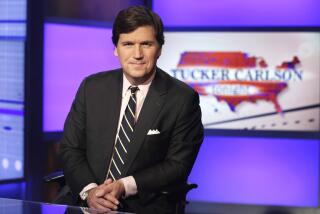Soviets Lead in Pre-Summit War of Words
- Share via
GENEVA — The Soviet Union, wooing world opinion as never before, has leaped ahead in the pre-summit war of words with the United States through a carefully orchestrated campaign of briefings on superpower relations.
Soviet leader Mikhail S. Gorbachev has named two image-makers to the Kremlin’s eight-man delegation to the two-day talks with President Reagan, indicating the likelihood of an intensified media campaign in the future as well. They are Leonid M. Zamyatin, head of the international information department for the Central Committee of the Communist Party, and Alexander N. Yakovlev, head of the party’s propaganda department.
Press Session Possible
Gorbachev, Moscow’s challenger to Reagan for the title of “Great Communicator,” has shown that he is confident and capable of dealing with Western correspondents. There was speculation that he may hold a news conference on Thursday after the summit ends.
At the same time, the Americans did not have an official spokesman here to counter the Soviet media blitz in the week before the President arrived, leaving the propaganda field open to the Kremlin’s specialists.
Charles Z. Wick, director of the U.S. Information Agency, said Saturday night he was so angry over some of the Soviet allegations that he wanted to create an American “truth squad” to correct distortions. But Wick was clearly playing catch-up.
“I couldn’t find an American official who would even tell me the time of day,” complained a British newspaper correspondent.
National security adviser Robert C. McFarlane finally appeared Sunday before the enormous press corps that has gathered here after a barrage of attacks against the United States launched by Soviet experts on arms control, regional disputes and Soviet-American relations.
It was reminiscent of a conference marking the 10th anniversary of the Helsinki agreements last August, when Soviet officials held open briefings and U.S. officials insisted on speaking anonymously to reporters.
Despite their departure from traditional Russian secretiveness, the Kremlin’s representatives here rarely provide anything new about Soviet foreign policy and often become close-mouthed when pressed for details. For example, they complained about rising casualties in Afghanistan but declined to say how many Soviet troops were in the country or reveal the number of casualties.
Gorbachev’s overall public relations strategy, however, was rated a brilliant success by White House officials after Time magazine published an interview with the Kremlin leader and after he dramatically proposed a new Soviet arms control package during a visit to France in October.
Vitality Attracts Attention
After years of elderly and ailing Kremlin chiefs, Gorbachev’s vitality alone attracts attention, and his proposals for reducing nuclear weapons were widely praised despite American criticism that they were one-sided in Moscow’s favor.
Image-maker Zamyatin, 62, is an old hand at advising Soviet leaders, having served under Leonid I. Brezhnev, Yuri V. Andropov and Konstantin U. Chernenko. While he has a reputation for being acerbic, Zamyatin now occasionally tells a joke to improve his own image.
Yakovlev, the other image-maker and a former Soviet ambassador to Canada, appears to be in the more open Gorbachev mold than the close-mouthed diplomats who once staffed Moscow’s embassies abroad.
Yakovlev is a firm advocate of Soviet policy, but his admirers say that he can explain it without being dogmatic or needlessly offensive to Western audiences. He was credited with helping to make Gorbachev’s visit to Britain in December, 1984, a success.
Other members of Gorbachev’s team also have public relations talents. The new foreign minister, Eduard A. Shevardnadze, smiles more than his predecessor, Andrei A. Gromyko, but is regarded as mainly a carrier of messages for Gorbachev rather than a policymaker.
Dobrynin on Team
Anatoly F. Dobrynin, the Soviet ambassador to Washington, is also on the Soviet team, along with Georgy M. Kornienko, deputy foreign minister, and Andrei M. Aleksandrov-Agentov, a personal aide to the last four Kremlin leaders.
The Soviet briefings have presented a variety of experts, including Col. Gen. Nikolai Chervov and Yevgeny P. Velikov, vice president of the Academy of Sciences, to discuss Soviet arms control positions in great detail.
Georgy A. Arbatov, the chief Americanologist in Moscow, apparently helped to organize the panels after his arrival here on Nov. 10. It was Arbatov who may have signaled the Kremlin’s attitude toward Reagan when he suggested that the President has a short attention span and needed pampering by his staff to get prepared for the summit.
More to Read
Sign up for Essential California
The most important California stories and recommendations in your inbox every morning.
You may occasionally receive promotional content from the Los Angeles Times.













